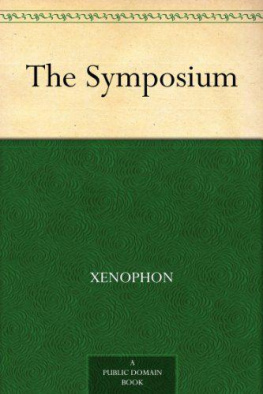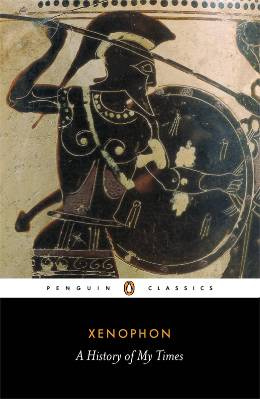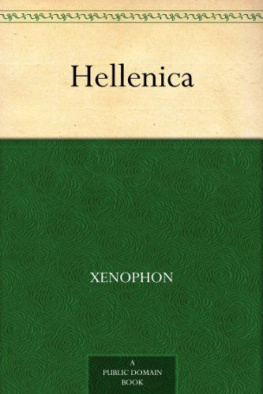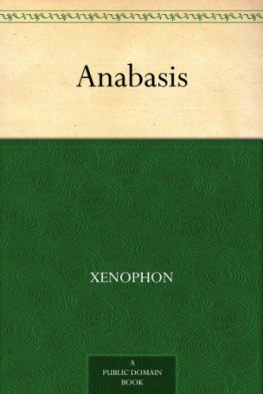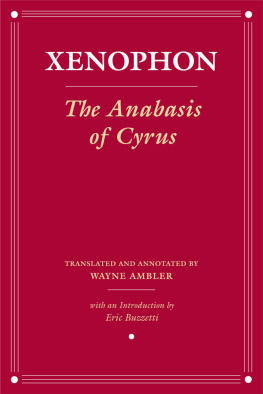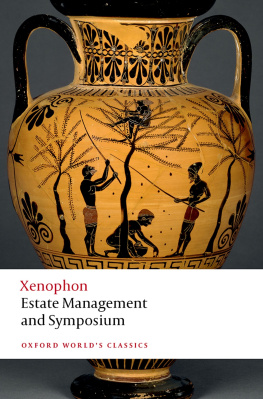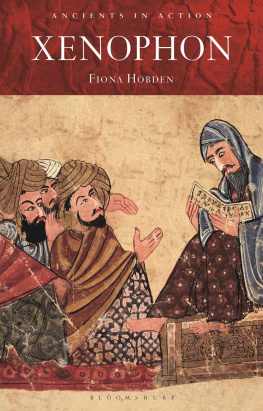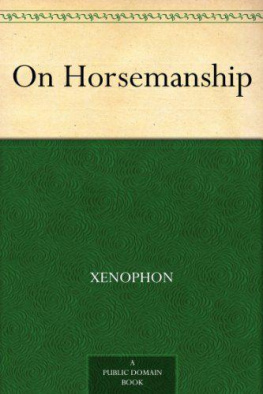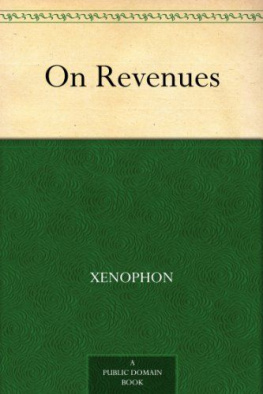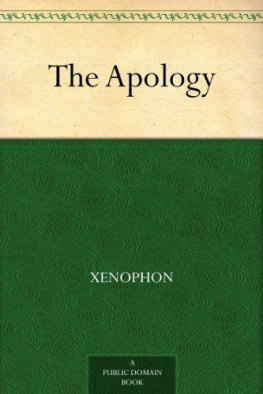Xenophon - The Symposium
Here you can read online Xenophon - The Symposium full text of the book (entire story) in english for free. Download pdf and epub, get meaning, cover and reviews about this ebook. year: 2012, genre: Art. Description of the work, (preface) as well as reviews are available. Best literature library LitArk.com created for fans of good reading and offers a wide selection of genres:
Romance novel
Science fiction
Adventure
Detective
Science
History
Home and family
Prose
Art
Politics
Computer
Non-fiction
Religion
Business
Children
Humor
Choose a favorite category and find really read worthwhile books. Enjoy immersion in the world of imagination, feel the emotions of the characters or learn something new for yourself, make an fascinating discovery.
The Symposium: summary, description and annotation
We offer to read an annotation, description, summary or preface (depends on what the author of the book "The Symposium" wrote himself). If you haven't found the necessary information about the book — write in the comments, we will try to find it.
The Symposium — read online for free the complete book (whole text) full work
Below is the text of the book, divided by pages. System saving the place of the last page read, allows you to conveniently read the book "The Symposium" online for free, without having to search again every time where you left off. Put a bookmark, and you can go to the page where you finished reading at any time.
Font size:
Interval:
Bookmark:
Xenophon the Athenian was born 431 B.C. He was a
pupil of Socrates. He marched with the Spartans,
and was exiled from Athens. Sparta gave him land
and property in Scillus, where he lived for many
years before having to move once more, to settle
in Corinth. He died in 354 B.C.
The Symposium records the discussion of Socrates
and company at a dinner given by Callias for the
youth Autolycus. Dakyns believed that Plato knew
of this work, and that it influenced him to some
degree when he wrote his own "Symposium."
PREPARER'S NOTE
This was typed from Dakyns' series, "The Works of Xenophon," a
four-volume set. The complete list of Xenophon's works (though
there is doubt about some of these) is:
Work Number of books
The Anabasis 7
The Hellenica 7
The Cyropaedia 8
The Memorabilia 4
The Symposium 1
The Economist 1
On Horsemanship 1
The Sportsman 1
The Cavalry General 1
The Apology 1
On Revenues 1
The Hiero 1
The Agesilaus 1
The Polity of the Athenians and the Lacedaemonians 2
Text in brackets "{}" is my transliteration of Greek text into
English using an Oxford English Dictionary alphabet table. The
diacritical marks have been lost.
For myself, (1) I hold to the opinion that not alone are the serious transactions of "good and noble men" (2) most memorable, but that words and deeds distinctive of their lighter moods may claim some record. (3) In proof of which contention, I will here describe a set of incidents within the scope of my experience. (4)
(1) See Aristid. ii. foll.
(2) Or, "nature's noblemen."
(3) Cf. Plut. "Ages." 29 (Clough, iv. 35): "And indeed if, as Xenophon
says, in conversation good men, even in their sports and at their
wine, let fall many sayings that are worth preserving." See Grote,
"Plato," ii. 228 foll. as to the sportive character of the work.
(4) Or, "let me describe a scene which I was witness of." See Hug.
"Plat. Symp." p. xv. foll.
The occasion was a horse-race (5) at the great Panathenaic festival. (6) Callias, (7) the son of Hipponicus, being a friend and lover of the boy Autolycus, (8) had brought the lad, himself the winner of the pankration, (9) to see the spectacle.
(5) See "Hipparch," ii. 1.
(6) "Held towards the end of July (Hecatombaeon) every year, and with
greater pomp every four years (the third of each Olympiad)."Gow,
84, 129, n.
(7) Callias. Cobet, "Pros. X." p. 67 foll.; Boeckh, "P. E. A." p. 481.
(8) See Cobet, op. cit. p. 54; Plut. "Lysand." 15 (Clough, iii. 120);
Grote, "H. G." ix. 261.
(9) 420 B.C., al. 421. The date is fixed by the "Autolycus" of
Eupolis. See Athen. v. 216. For the pankration, which comprised
wrestling and boxing, see Aristot. "Rhet." i. S. 14.
As soon as the horse race was over, (10) Callias proceeded to escort Autolycus and his father, Lycon, to his house in the Piraeus, being attended also by Niceratus. (11) But catching sight of Socrates along with certain others (Critobulus, (12) Hermogenes, Antisthenes, and Charmides), he bade an attendant conduct the party with Autolycus, whilst he himself approached the group, exclaiming:
(10) See A. Martin, op. cit. p. 265.
(11) Niceratus. See Cobet, op. cit. 71; Boeckh, "P. E. A." 480; Plat.
"Lach." 200 C; "Hell." II. iii. 39; Lys. xviii.; Diod. xiv. 5.
(12) Critobulus, Hermogenes, Antisthenes, Charmides. See "Mem."
A happy chance brings me across your path, just when I am about to entertain Autolycus and his father at a feast. The splendour of the entertainment shall be much enhanced, I need not tell you, if my hall (13) should happily be graced by worthies like yourselves, who have attained to purity of soul, (14) rather than by generals and cavalry commanders (15) and a crowd of place-hunters. (16)
(13) Or, "dining-room." See Becker, "Charicles," 265.
(14) See Grote, "H. G." viii. 619 foll. Cf. Plat. "Rep." 527 D;
"Soph." 230 E.
(15) Lit. Strategoi, Hipparchs.
(16) Or, "petitioners for offices of state." Reading {spoudarkhiais}.
Whereat Socrates: When will you have done with your gibes, Callias? Why, because you have yourself spent sums of money on Protagoras, (17) and Gorgias, and Prodicus, and a host of others, to learn wisdom, must you pour contempt on us poor fellows, who are but self-taught tinkers (18) in philosophy compared with you?
(17) As to Protagoras of Abdera, Gorgias of Leontini, Prodicus of
Ceos, see Plat. "Prot." 314 C, "Rep." x. 600 C, "Apol." 19 E;
"Anab." II. vi. 17; "Mem." II. i. 21; "Encyc. Brit." "Sophists,"
H. Jackson.
(18) Or, "hand-to-mouth cultivators of philosophy," "roturiers." Cf.
Plat. "Rep." 565 A: "A third class who work for themselves"; Thuc.
i. 141: "The Peloponnesians cultivate their own soil, and they
have no wealth either public or private." Cf. "Econ." v. 4.
Hitherto, no doubt (retorted Callias), although I had plenty of wise things to say, I have kept my wisdom to myself; but if only you will honour me with your company to-day, I promise to present myself in quite another light; you will see I am a person of no mean consideration after all. (19)
(19) Or, "I will prove to you that I am worthy of infinite respect."
Socrates and the others, while thanking Callias politely for the invitation, were not disposed at first to join the dinner party; but the annoyance of the other so to be put off was so obvious that in the end the party were persuaded to accompany their host.
After an interval devoted to gymnastic exercise (and subsequent anointing of the limbs) by some, whilst others of them took a bath, the guests were severally presented to the master of the house.
Autolycus was seated next his father, as was natural, (20) while the rest reclined on couches. Noting the scene presented, the first idea to strike the mind of any one must certainly have been that beauty has by nature something regal in it; and the more so, if it chance to be combined (as now in the person of Autolycus) with modesty and self-respect. Even as when a splendid object blazes forth at night, the eyes of men are riveted, (21) so now the beauty of Autolycus drew on him the gaze of all; nor was there one of those onlookers but was stirred to his soul's depth by him who sat there. (22) Some fell into unwonted silence, while the gestures of the rest were equally significant.
(20) Al. "Autolycus found a seat beside his father, while the rest
reclined on couches in the usual fashion." See Schneider's note.
(21) Passage imitated by Max. Tyr. "Or." xxiv. 4.
(22) Cf. Plat. "Charm." 154.
It seems the look betokening divine possession, no matter who the god, must ever be remarkable. Only, whilst the subject of each commoner emotion passion-whirled may be distinguished by flashings of the eye, by terror-striking tones of voice, and by the vehement fervour of the man's whole being, so he who is inspired by temperate and harmonious love (23) will wear a look of kindlier welcome in his eyes; the words he utters fall from his lips with softer intonation; and every gesture of his bodily frame conform to what is truly frank and liberal. Such, at any rate, the strange effects now wrought on Callias by love. He was like one transformed, the cynosure of all initiated in the mysteries of this divinity. (24)
(23) Cf. Plat. "Rep." iii. 403 A: "Whereas true love is a love of
beauty and order, temperate and harmonious."
(24) Cf. "Econ." xxi. 12.
So they supped in silence, the whole company, as if an injunction had been laid upon them by some superior power. But presently there came a knocking on the door! Philippus the jester bade the doorkeeper (25) announce him, with apologies for seeking a night's lodging: (26) he had come, he said, provided with all necessaries for dining, at a friend's expense: his attendant was much galled with carrying, nothing but an empty bread-basket. (27) To this announcement Callias, appealing to his guests, replied: "It would never do to begrudge the shelter of one's roof: (28) let him come in." And as he spoke, he glanced across to where Autolycus was seated, as if to say: "I wonder how you take the jest."
Font size:
Interval:
Bookmark:
Similar books «The Symposium»
Look at similar books to The Symposium. We have selected literature similar in name and meaning in the hope of providing readers with more options to find new, interesting, not yet read works.
Discussion, reviews of the book The Symposium and just readers' own opinions. Leave your comments, write what you think about the work, its meaning or the main characters. Specify what exactly you liked and what you didn't like, and why you think so.

